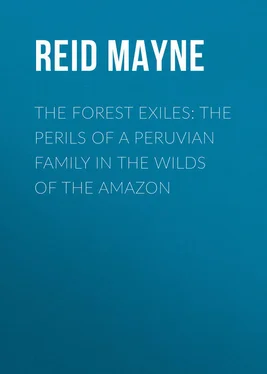Mayne Reid - The Forest Exiles - The Perils of a Peruvian Family in the Wilds of the Amazon
Здесь есть возможность читать онлайн «Mayne Reid - The Forest Exiles - The Perils of a Peruvian Family in the Wilds of the Amazon» — ознакомительный отрывок электронной книги совершенно бесплатно, а после прочтения отрывка купить полную версию. В некоторых случаях можно слушать аудио, скачать через торрент в формате fb2 и присутствует краткое содержание. Жанр: literature_19, foreign_antique, foreign_prose, на английском языке. Описание произведения, (предисловие) а так же отзывы посетителей доступны на портале библиотеки ЛибКат.
- Название:The Forest Exiles: The Perils of a Peruvian Family in the Wilds of the Amazon
- Автор:
- Жанр:
- Год:неизвестен
- ISBN:нет данных
- Рейтинг книги:4 / 5. Голосов: 1
-
Избранное:Добавить в избранное
- Отзывы:
-
Ваша оценка:
- 80
- 1
- 2
- 3
- 4
- 5
The Forest Exiles: The Perils of a Peruvian Family in the Wilds of the Amazon: краткое содержание, описание и аннотация
Предлагаем к чтению аннотацию, описание, краткое содержание или предисловие (зависит от того, что написал сам автор книги «The Forest Exiles: The Perils of a Peruvian Family in the Wilds of the Amazon»). Если вы не нашли необходимую информацию о книге — напишите в комментариях, мы постараемся отыскать её.
The Forest Exiles: The Perils of a Peruvian Family in the Wilds of the Amazon — читать онлайн ознакомительный отрывок
Ниже представлен текст книги, разбитый по страницам. Система сохранения места последней прочитанной страницы, позволяет с удобством читать онлайн бесплатно книгу «The Forest Exiles: The Perils of a Peruvian Family in the Wilds of the Amazon», без необходимости каждый раз заново искать на чём Вы остановились. Поставьте закладку, и сможете в любой момент перейти на страницу, на которой закончили чтение.
Интервал:
Закладка:
Don Pablo had already passed the outskirts of civilisation. Any settlement he might find beyond would be the hut of some half-wild Indian. There was no fear of his encountering a white face upon the unfrequented path he had chosen, though had he gone by some other route he might have found white settlements extending farther to the eastward. As it was, the wilderness lay before him, and he would soon enter it.
And what was he to do in the wilderness ? He knew not. He had never reflected on that. He only knew that behind him was a relentless foe thirsting for his life. To go back was to march to certain death. He had no thoughts of returning. That would have been madness. His property was already confiscated – his death decreed by the vengeful Viceroy, whose soldiers had orders to capture or slay, wherever they should find him. His only hope, then, was to escape beyond the borders of civilisation – to hide himself in the great Montaña. Beyond this he had formed no plan. He had scarcely thought about the future. Forward, then, for the Montaña!
The road which our travellers followed was nothing more than a narrow path, or “trail” formed by cattle, or by some party of Indians occasionally passing up from the lower valleys to the mountain-heights. It lay along the edge of a torrent that leaped and foamed over its rocky bed. The torrent was no doubt on its way to join the greatest of rivers, the mighty Amazon – the headwaters of which spring from all parts of the Andes, draining the slopes of these mountains through more than twenty degrees of latitude!
Towards evening the little party were beginning to enter among the mountain spurs, or foot-hills. Here the travelling grew exceedingly difficult, the path sometimes running up a steep acclivity and then descending into deep ravines – so deep and dark that the sun’s rays seemed hardly to enter them. The road was what Spanish-Americans term, “ Cuesta arriba, cuesta abajo ” (up hill, down hill).
In no part of the world are such roads to be met with as among the Andes Mountains, both in South America and in their Mexican continuation through the northern division of the continent. This arises from the peculiar geological structure of these mountains. Vast clefts traverse them, yawning far into the earth. In South America these are called quebradas . You may stand on the edge of one of them and look sheer down a precipice two thousand feet! You may fancy a whole mountain scooped out and carried away, and yet you may have to reach the bottom of this yawning gulf by a road which seems cut out of the face of the cliff, or rather has been formed by a freak of Nature – for in these countries the hand of man has done but little for the roads. Sometimes the path traverses a ledge so narrow that scarce room is found for the feet of your trusty mule. Sometimes a hanging bridge has to be crossed, spanning a horrid chasm, at the bottom of which roars a foaming torrent – the bridge itself, composed of ropes and brambles, all the while swinging like a hammock under the tread of the affrighted traveller!
He who journeys through the tame scenery of European countries can form but little idea of the wild and dangerous highways of the Andes. Even the passes of the Alps or Carpathians are safe in comparison. On the Peruvian road the lives of men and animals are often sacrificed. Mules slide from the narrow ledges, or break through the frail “soga” bridges, carrying their riders along with them, whirling through empty air to be plunged into foaming waters or dashed on sharp rocks below. These are accidents of continual occurrence; and yet, on account of the apathy of the Spano-Indian races that inhabit these countries, little is done for either roads or bridges. Every one is left to take care of himself, and get over them as he best may. It is only now and then that positive necessity prompts to a great effort, and then a road is repaired or a broken bridge patched with new ropes.
But the road that was travelled by Don Pablo had seen no repairs – there were no bridges. It was, in fact, a mere pathway where the traveller scrambled over rocks, or plunged into the stream, and forded or swam across it as he best could. Sometimes it lay along the water’s edge, keeping in the bottom of the ravine; at other places no space was left by the water, and then the path ascended and ran along some ledge perhaps for miles, at the end of which it would again descend to the bed of the stream.
Chapter Twelve.
Encounter upon a Cliff
That night they encamped in the bottom of the ravine close to the water’s edge. They found just enough of level ground to enable them to stretch themselves, but they were contented with that. There was nothing for the animals to eat except the succulent, but thorny, leaves of the Cactus opuntia , or the more fibrous blades of the wild agave. This evening there were no quiñoa seeds to be had, for none of these trees grew near. Even the botanist, Don Pablo, could find no vegetable substance that was eatable, and they would have to sup upon the vicuña meat, without bread, potatoes, or other vegetables. Their stock of ocas, ullucas, and macas, was quite out. They had cooked the last of the macas for that morning’s meal.
Guapo here came to their relief. Guapo’s experience went beyond the theoretical knowledge of the botanist. Guapo knew a vegetable which was good to eat – in fact, a most delicious vegetable when cooked with meat. This was no other than the fleshy heart of the wild maguey ( agave ), with part of the adhering roots. Among naked rocks, in the most barren parts of the desert wilderness, the wild agave may be found growing in luxuriance. Its thick, succulent blades, when split open, exude a cool liquid, that often gives considerable relief to the thirsty traveller; while the heart, or egg-shaped nucleus from which spring the sheathing leaves – and even parts of the leaves themselves – when cooked with any sort of meat, become an excellent and nourishing food. The Indians make this use of the aloe on the high plains of Northern Mexico, among the roving bands of the Apache, Navajo, and Comanche. These people cook them along with horse’s flesh, for there the wild horse is the principal food of whole tribes. Their mode of cooking, both the flesh and the aloe, is by baking them together in little ovens of stones sunk in the ground, and then heated by fire until they are nearly red-hot. The ashes are then cleared out, the meat and vegetables placed in the ovens, and then buried until both are sufficiently done. In fact, there is one tribe of the Apaches who have obtained the name of “Mezcaleros,” from the fact of their eating the wild aloe, which in those countries goes under the name of “mezcal” plant.
In many parts of the Andes, where the soil is barren, the wild maguey is almost the only vegetation to be seen, and in such places the Indians use it as food. It seems to be a gift of Nature to the desert, so that even there man may find something on which to subsist.
Guapo with his knife had soon cleared off several large pieces of the maguey, and these, fried along with the vicuña meat, enabled the party to make a supper sufficiently palatable. A cup of pure water from the cold mountain stream, sweeter than all the wine in the world, washed it down; and they went to rest with hearts full of contentment and gratitude.
They rose at an early hour, and, breakfasting as they had supped, once more took the road.
After travelling a mile or two, the path gradually ascended along one of those narrow ledges that shelve out from the cliff, of which we have already spoken. They soon found themselves hundreds of feet above the bed of the torrent, yet still hundreds of feet above them rose the wall of dark porphyry, seamed, and scarred, and frowning. The ledge or path was of unequal breadth – here and there forming little tables or platforms. At other places, however, it was so narrow that those who were mounted could look over the brink of the precipice into the frothing water below – so narrow that no two animals could have passed each other. These terrible passes were sometimes more than an hundred yards in length, and not straight, but winding around buttresses of the rock, so that one end was not visible from the other.
Читать дальшеИнтервал:
Закладка:
Похожие книги на «The Forest Exiles: The Perils of a Peruvian Family in the Wilds of the Amazon»
Представляем Вашему вниманию похожие книги на «The Forest Exiles: The Perils of a Peruvian Family in the Wilds of the Amazon» списком для выбора. Мы отобрали схожую по названию и смыслу литературу в надежде предоставить читателям больше вариантов отыскать новые, интересные, ещё непрочитанные произведения.
Обсуждение, отзывы о книге «The Forest Exiles: The Perils of a Peruvian Family in the Wilds of the Amazon» и просто собственные мнения читателей. Оставьте ваши комментарии, напишите, что Вы думаете о произведении, его смысле или главных героях. Укажите что конкретно понравилось, а что нет, и почему Вы так считаете.












